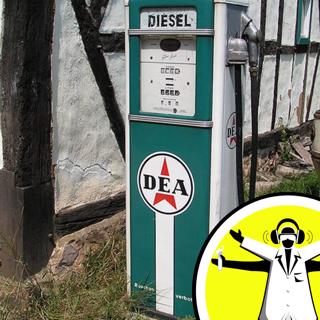
Outpacing Petrol - Biofuels and Hydrogen
This week, we're investigating alternatives to petrol. We'll board a biofuel powered bus to meet the plant scientists who are using algae to make biodiesel. We'll find out how to turn household waste into hydrogen, and meet the brains behind Bristol's first hydrogen powered passenger boat! Plus, the brain basis of boundless optimism, why a bacteria-busting chemical keeps injured arteries open, and a run down of this year's Nobel prizes! Like this podcast? Please help us by supporting the Naked Scientists
8 Okt 20111h 3min

Would a Siphon Work in Space?
Could a Siphon be used in orbit? Why do leaves change colour in Autumn? How is immunity passed from mother to baby through breastfeeding? Why do earthquakes happen away from plate boundaries? How do microwaves heat up food? We storm through your questions this week as well finding out how Twitter can be used to monitor moods around the world, how carbon dioxide can be converted back into a fuel, how biomarkers hidden inside ECG's can predict the risk of a repeat heart attack and how glowing bacteria can send secret messages! Plus, in Kitchen Science, we make flames without fire by making iron... Like this podcast? Please help us by supporting the Naked Scientists
1 Okt 20111h 7min
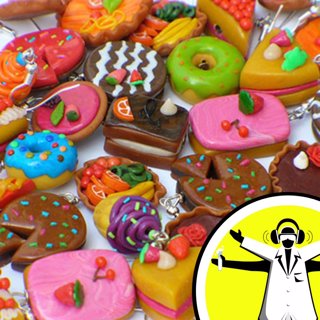
Cheese Making and Cake Baking: The Chemistry of Cookery
We've whipped up an appetising take on the science of food and cooking for you this week. With a main course of cookery in the kitchen served up by a cake-baking physicist followed by a microbiological look at the cheese board and then the bacterial basis of the Best Before Date for dessert, this three-course scientific combo is an absolute academic feast. Also on the menu this week, how scientists are using brain scanners to reconstruct the movies we see in the mind's eye and we ask whether Einstein was wrong as scientists report particles apparently moving faster-than-light... Like this podcast? Please help us by supporting the Naked Scientists
24 Sep 20111h 10min

Chilling Out - The Science of Cryogenics
This week, we're chilling out in the world of cryogenics, the science of the super-cold. We'll find out what happens to living tissue when it freezes, and how we can use low temperatures to keep organs, and maybe even one day whole bodies, in suspended animation. We also talk to the company behind an attractive new design of super-efficient fridge that runs on magnetism. In the news we hear how computer gamers have contributed to a breakthrough in HIV, why humans are programmed for overconfidence, and how the nervous system controls the immune system. Plus, we ask, is modern medicine altering... Like this podcast? Please help us by supporting the Naked Scientists
17 Sep 20111h 3min
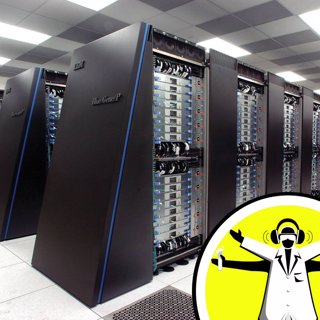
Supercomputers & Super Computing
This week, we seek the science of supercomputers! We find out how they work, and how they can answer some of the biggest questions in science. We also hear about the World Community Grid, which offers scientists computer time donated by volunteers worldwide. In the news we hear how computer aided design can help breast restoration, why special stem cells with just one set of chromosomes can aid geneticists, and how Earth's precious gold may have come from outer space. Plus, we explore the workings of the humble calculator in Question of the Week! Like this podcast? Please help us by supporting the Naked Scientists
10 Sep 201157min
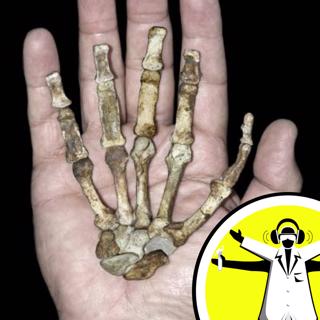
Australopithecus Sediba Special
Reader in evolution at Wits University, Lee Berger, made a life-changing discovery when he uncovered the remains of a new species of hominid, Australopithecus sediba, in South Africa. Here, Chris Smith gets to meet the newest addition to the human family tree... Like this podcast? Please help us by supporting the Naked Scientists
7 Sep 201137min

Why do some animals dump indiscriminately?
Why do some animals poo wherever the fancy takes them, whilst others are more fussy about the locations of their lavatory actions? What triggers pins and needles? How do some fish survive in both fresh and saltwater? And how are new nerve cells born in the adult brain? We burn through your best science questions this week as well as taking a look at Hubble's successor, the James Webb Space Telescope, and hearing how a computer model of a heart can revolutionise cardiac drug design and reviewing the evidence that bacteria were already antibiotic resistant over 30,000 years ago... Like this podcast? Please help us by supporting the Naked Scientists
3 Sep 20111h 6min
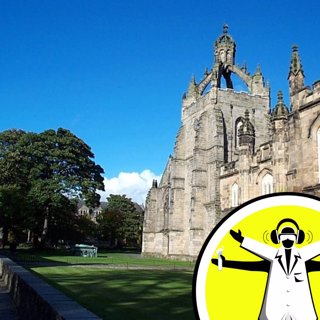
Science in Scotland
This week, Chris explores some of the cutting edge research taking place in Aberdeen. We meet a scientist making new cannabis-like chemicals that lack the side effects of the real thing, talk to a man exploring the deepest part of the Pacific - 7 miles down - to find out what's living there. Plus, thalidomide - 50 years on. Scientists now know why it had the damaging effects it did on unborn babies, but can they make a safe form of the agent so it can be used to treat cancers, leprosy and HIV? Like this podcast? Please help us by supporting the Naked Scientists
27 Aug 201158min





















